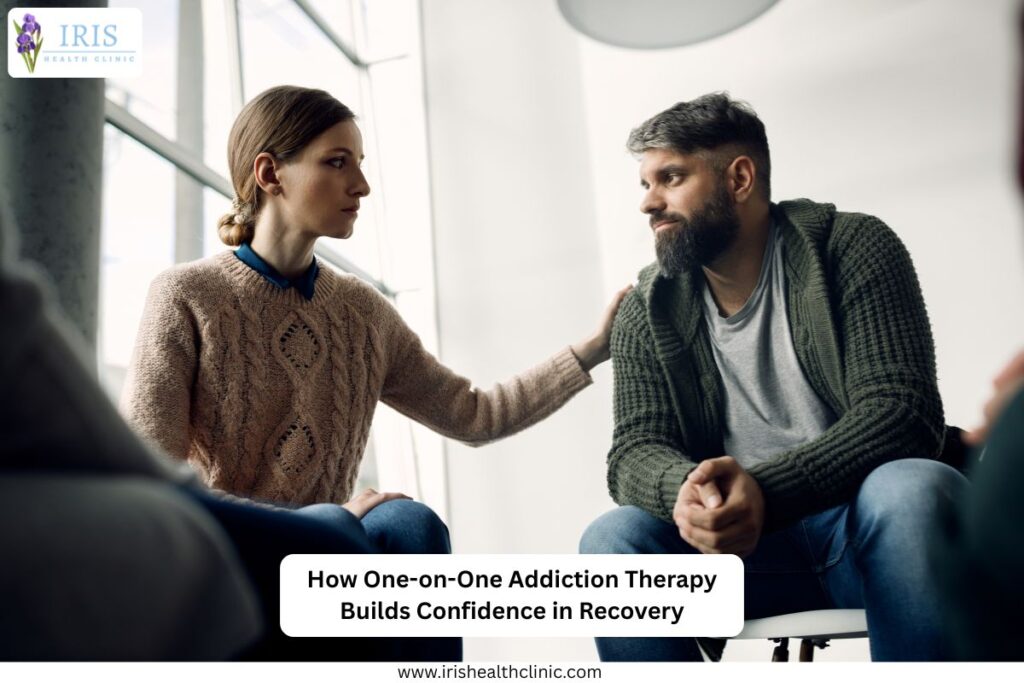Addiction can feel crushing. Many people fighting substance use deal with deep loneliness and hopelessness. It’s a major problem across the country. The National Institute on Drug Abuse says only about 10% of those who need treatment actually get it. Recovery starts with the right kind of help. That is where one-on-one addiction therapy changes everything. It is personal, focused, and powerful. This kind of care helps people rebuild from within. It gives them control, strength, and real confidence to move forward.
At Iris Health Clinic, we believe in this approach. Every session is built around one goal: helping each person heal, grow, and rediscover who they are. Because recovery is not just about quitting, it is about rebuilding your life.
What Is One-on-One Addiction Therapy All About?
One-on-one addiction therapy is a focused approach that helps people heal in a personal way. It is just you and the therapist, meeting regularly. Each session stays private and confidential. Nothing leaves the room.
- The best part is that it is completely tailored to individual needs. The therapist designs a personalized plan that tackles specific challenges.
- It takes into account your background and what you are dealing with now.
Often called individual therapy services, this form of treatment gives a safe space to open up. You can talk freely without feeling judged. The aim is to uncover the real reasons behind addiction and build stronger, healthier ways to cope.
- Sessions focus on specific triggers.
- They address underlying mental health issues.
- You learn about your patterns.
Why Does Personalised Attention Matter in Recovery?
Personalized attention is crucial. It makes a significant difference. Group therapy is valuable. However, individual therapy for addiction treatment offers unique benefits. It gives deep exploration.
- Undivided attention from the therapist is a major advantage.
- You receive direct feedback.
- The therapist can adapt strategies instantly.
The therapist can build a strong rapport. This connection is essential for trust. Trust is fundamental in the healing process. You feel heard and understood. This fosters a sense of safety. It encourages openness.
- Sessions are flexible.
- They can be adjusted based on progress.
- The pace of therapy is client-driven.
One-on-one addiction therapy allows for a deeper dive. It explores personal experiences, uncovers hidden stressors & addresses trauma. These are often linked to substance abuse. Addressing these issues directly is vital. It paves the way for lasting recovery.
How Does Honest Reflection Help Rebuild Self-Esteem?
Addiction can erode self-esteem. Individuals may feel guilt or shame. They might view themselves negatively. One-on-one therapy sessions provide a space for honest reflection. This reflection is guided by a compassionate professional.
- You can examine past behaviors.
- You learn to understand your choices.
- The therapist helps reframe negative thoughts.
The process involves identifying strengths. It also involves acknowledging achievements. Even small victories are celebrated. This helps rebuild a positive self-image. It fosters self-compassion.
- Challenging negative self-talk is a core component.
- Therapists use techniques like cognitive-behavioral therapy (CBT).
- These techniques help restructure harmful thought patterns.
Learning to forgive oneself is also important. This is a crucial step in healing. Honest reflection leads to self-acceptance. It empowers individuals to move forward. It builds a foundation of self-worth. This self-worth is vital for sustained sobriety.

How Do You Develop Coping Skills and Emotional Strength in Therapy?
Recovery is not just about halting substance use. It is also about building new life skills. Individual drug counseling focuses on this. It equips you with tools. These tools help them navigate challenges. They learn to manage stress. They learn to handle triggers.
- Identifying triggers is a primary focus.
- You learn strategies to avoid high-risk situations.
- They develop alternative responses to cravings.
Emotional strength is built over time. You learn to identify emotions. You learn healthy ways to express them. This includes anger, sadness, and frustration. Suppressing emotions can lead to relapse. Learning to process them constructively is empowering.
- Stress management techniques are taught.
- Mindfulness and relaxation exercises are common.
- You develop healthier communication skills.
The therapist helps you practice these skills. They role-play difficult scenarios. They discuss real-life situations. This prepares you for life outside therapy. It gives you confidence in your ability to cope. One-on-one addiction therapy provides a safe environment for this practice. This builds resilience.
How Does One-on-One Therapy Build Long-Term Confidence After Recovery?
The goal of one-on-one addiction therapy is long-term recovery. It aims for a fulfilling life. This means life after formal treatment ends. Building confidence during therapy prepares individuals for this next phase.
- Relapse prevention strategies are a key focus.
- You learn to recognize warning signs.
- They develop an action plan for potential setbacks.
Confidence gained in therapy is transferable. It extends to all areas of life. This includes relationships, work, and personal goals. You feel more capable. control and better equipped to face future challenges.
- Developing a strong support network is encouraged.
- This can include family, friends, or support groups.
- The therapist helps you build these connections.
Life after therapy takes steady effort. The lessons learned and confidence gained stay with you. They act like a compass, helping you stay on track. Every small win builds strength. Over time, this belief in yourself becomes unshakable. That belief is what keeps real change alive.
Ready to rediscover your confidence and rebuild your life?
Recovery looks different for everyone. One-on-one addiction therapy gives you a path made just for you. It meets your personal needs and builds real-life skills. Most importantly, it helps you find confidence again. Confidence not just to stay clearheaded, but to live fully.
At Iris Health Clinic, we guide you through every stage. Our care is evidence-based and community-focused. We are proud to support individuals across Wisconsin. Remember, recovery is not a finish line. It is a journey of growth, learning, and rediscovering who you are.
FAQs
1. How long does a typical one-on-one addiction therapy session last, and how often should I attend?
One-on-one therapy sessions usually last 45 to 60 minutes. The schedule isn’t fixed. Most people start with weekly or twice-weekly sessions. It really depends on your needs and where you are in recovery.
2. Does individual drug counseling involve family members or partners?
Individual drug counseling mainly focuses on you. But it can include family or partners, too. Our therapists suggest separate family or couple sessions alongside personal therapy.
3. What types of therapy are used in individual therapy services for addiction?
Our therapists mix different evidence-based methods in individual therapy services. The most common are CBT, DBT, and MI. Each has its own focus.
4. Is one-on-one addiction therapy only for severe cases of substance abuse?
Not at all. One-on-one addiction therapy helps with mild, moderate, or severe issues. It also works well for people with mental health struggles like anxiety or depression.

